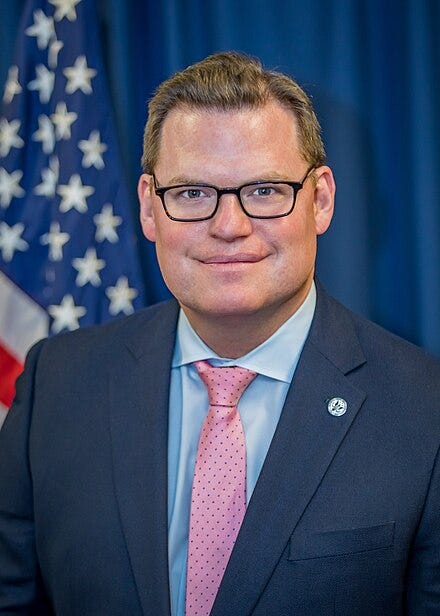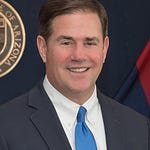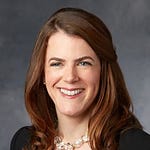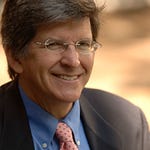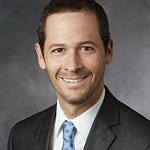Kyle Hauptman (National Credit Union Administration Vice Chairman) speaks on his beginnings working in finance, as an economic policy advisor on the Mitt Romney Presidential campaign as well as in Congress before becoming Vice Chairman of the NCUA, one of the top U.S. financial regulators overseeing approximately 5,000 credit unions which count over 140 million members. Topics ranging from the history of credit unions, deposit insurance and financial regulation, along with how financial regulators are adapting to a world with cryptocurrency and digital assets, are discussed.
Jon: “Welcome to the Capitalism and Freedom in the 21st Century podcast. I'm Jon Hartley, your host. Thanks so much for joining us. Today we have Kyle Hauptman, who is the vice chair for the National Credit Union Administration as our guest. Welcome, Kyle.”
Kyle: “Thank you.”
Jon: “The National Credit Union Administration, for those who aren't aware, is the regulator and public insurer of America's 5,000 credit unions, which have nearly 140 million members, about half the U.S. population. Before being appointed vice chair, Kyle previously worked for Senator Tom Cotton on the Senate Banking Committee staff, where he ran the Economic Policy Subcommittee. Before that, he worked at various think tanks and on Wall Street. Again, welcome, Kyle. So glad to have you with us. How did you get interested in finance and economic policy to begin with? Tell us a little bit more about your background and how you got interested in all this. Yeah.”
Kyle: “So I was always interested in politics. I grew up in a fairly lefty family. My parents were political and always loved politics and policy. I wound up working in Wall Street and in the interest rate area, short-end bonds, trading, that sort of thing, the repo markets, where what you focus on is geopolitical events and government things and central banks, versus like if you work in stocks, you'd be talking a lot about various companies, right? Anyway, I wound up in 2008 with Lehman Brothers when it collapsed. And my interest in policy was rekindled because there was a policy angle to all that, if you remember. We were sitting there at Lehman when it was all falling apart. And there was no way for, at that time, an international investment bank to restructure and bankruptcy. Restructuring the bankruptcy code is one of the best things about American business. A lot of airlines have gone through it, some more than once, et cetera. And it was kind of a game of chicken with the Bush administration. Our friends at Bear Stearns had had a quasi-bailout a few months earlier. The government stepped in to help them merge with JP Morgan and over a weekend and on Monday, life sort of went on for a while. But they wanted to do, and I understand this, the Bush administration didn't want to bail somebody out. And it is Lehman's management responsibility to steer clear of the iceberg, right? This is on them and nobody else. But at the time, because it was an investment bank, Lehman couldn't access cheap money through the Fed discount window and the bankruptcy code was not well suited for it. Some of your Stanford colleagues historically have worked on what they call Chapter 14, I guess, right?”
Jon: “Of course, John Taylor.”
Kyle: “Yeah, 100%. So anyway, not only was it a company and being, you know, going under, which it did, I was with them when they collapsed. There was a policy interest in it. So when I had an opportunity a few years later, I was out in Japan, I was in Tokyo. And I left my position there and moved to Boston to work for Mitt Romney's presidential campaign. And this was 2011. And then obviously he won the primary. So that was cool. But then he lost the general to Barack Obama. And my one year kind of experiment in policy and politics, I really enjoyed it. But instead of coming to DC as a member of the new Romney administration, I decided to move to DC and look for a job.”
Jon: “Well, that's great. You know, I'd say at the Senate Banking Committee staff, I'd say it's certainly a fantastic experience. In addition to spending a whole year working as an economic policy advisor on a presidential campaign, no one's won its own primary. It's a fantastic experience. So this brings us to becoming vice chair of the NCUA. Can you explain to us what the NCUA does and what explicitly what a credit union technically is, how it's different from a regular bank and how they started, how credit unions started in the U.S.?”
Kyle: “Yeah, and just to be clear on that, regarding Senate Banking, the chairman was Mike Rabeoff, and I did not work for his staff, but my boss, Senator Cottonwood, was chairman of the Supreme Court. So I ran that economic policy stuff, and we had some cool hearings that I know you liked. Credit unions are very much like banks, except they are non-profits, and the difference is not anyone can join one. You have to have what's called a field of membership. They originally started with mill workers, where the group of employees came together, and they deposited their paychecks, and then they got loans from that pool of money. They came from Quebec originally, and some Quebecois folks came over to New Hampshire, and that's where the first one was founded.”
Jon: “It's funny because you're from Maine.”
Kyle: “That's right. Maine is the only state that only borders one state, borders New Hampshire.”
Jon: “That's fantastic. It's so fascinating that you'd be born in Maine, and things come full circle here. So there's over 5,000 of them in the U.S., and it covers – there's over 5,000 credit unions in the U.S., and about 140 million people or Americans have or are members of some sort of credit union. They very well could have bank accounts elsewhere. Explain to me, how does an account at a credit union differ from a regular bank account?”
Kyle: “The main thing is field of membership and that they are non-profit institutions. So a group of people like, for example, the Disney employees have their own credit union. American Airlines does. The biggest one is Navy Federal, which is friends and family of – sorry, not friends and family – family and members of the military, and then their families. So that's the largest one. And in theory, the customer service end is a little better because you have a commonality. That's the notion behind it, okay? And I'm not here to mock other financial institutions like small town banks, who also probably provide good community service. But in theory, you're going to get better rates because people pay their loans back a little bit more than they would other loans because there's a commonality, because you'd be hurting a fellow employee of your company or a fellow member of the armed services or something like that. So they have their own regulator, which is MTA, which provides insurance identical to that of FDIC for banks.”
Jon: “Got it. So it's basically a credit union is like a non-profit kind of community bank.”
Kyle: “It's a cooperative.”
Jon: “It's a cooperative.”
Kyle: “It's a cooperative model. They don't have customers. They don't have members. They don't have shareholders. That field of membership, I should mention, they collectively own it.”
Jon: “Got it.”
Kyle: “So it's owned by the members. It's a cooperative.”
Jon: “So you're sort of both a depositor and a partial owner. So if there's excess profits, you get that back in a dividend.”
Kyle: “Something that's very much like a dividend. They call it just a distribution that is taxable income just like a dividend, and they send it back to the members. So everybody, if there's excess money to be spent, every member of the credit union gets a piece of that.”
Jon: “Got it. And the NCUA is like the FDIC for credit unions, which you are the vice chair of. So this is fascinating. And I think there's some other limits as well, like some other small differences between credit unions and banks. There's some limits on how much they can invest. There's some other rules like this. But in terms of the NCUA and its role, it acts as an insurer, a regulator, a bit of a liquidity provider as well. It has a discount window type function as well. So in many respects, it's kind of fulfilling both sort of what the function of the FDIC does on the insurer side of things, and then also kind of what the Federal Reserve does in some respects, both in being a regulator and a liquidity provider.”
Kyle: “I was confirmed right at the tail end of the Trump administration in December 2020. At the time, there were about 5,500 credit unions. It's now dead to just under 5,000. That group of 5,000 American credit unions is about 3,000 federal charters, where we at NCUA are their regulator and insurer, and then the other 2,000 are state charters, where their state government is their regulator, and then we are just their insurer.”
Jon: “Got it. That's fascinating. So some of these credit unions have state charters, some have federal charters.”
Kyle: “Yeah, some states don't allow it. There's a handful of states that don't allow state charters. They just never enacted their own credit union act, in which case they only have federal charters. But there's about 45, I believe, 45 states that have a state charter, and in that case, you have the option in those states of pursuing a federal charter or a state charter, and either way, you'd be insured by NCUA.”
Jon: “Got it. Got it. And so the things that are sort of often like things on credit union balance sheets are often things like mortgages and car loans, and there's some limits to actual investment.”
Kyle: “Yeah, credit unions are very mainstream in the sense car loans and home loans. That's what they do. That's 85% of the total assets. They can put excess cash in other things. They can buy treasuries or something, but pretty much they do that. They have, in return for their nonprofit status, some restrictions. Now, some of the credit unions advocate to remove all those restrictions, but at that point, you're a bank, and then be a bank. But they have limits on their business lending, et cetera. By the way, if you remember, obviously, the pandemic when it started, the PPP loans, Congress did exempt credit unions from that business cap in order to get those PPP loans out. But essentially, credit unions are cooperatives that make car loans and home loans.”
Jon: “Okay, fascinating. And so NCUA, it's kind of like the Fed in the sense that you have like governors who are full-time in that you have six-year terms.”
Kyle: “Yep.”
Jon: “And, you know, unlike the Fed and also like the CFTC and SEC and other regulators, you have only three members, right, who chair the NCUA.”
Kyle: “In 1970, when they created a separate independent regulator, that's us, NCUA. So it's only existed since 1970. I'm only the 40th person to ever serve on the three-member board. Yeah, they set up with three, and we have staggered six-year terms because the president is a Democrat. That means the chair, my colleague Todd Harper, I get along with him well, he is the chairman of the NCUA, and the other two of us are not the chair.”
Jon: “Got it. Got it. That's so fascinating. So I guess explain to us, you know, what has been your mandate at the NCUA and what has been your top priorities since coming in as vice chair?”
Kyle: “Yeah. You know, those are kind of two separate questions. One is the mandate is the same for anybody in my position. During my time, the absolute most important thing is to protect the safety and soundness of the system, which is another way of saying protect our $20 billion insurance fund. Just like FDIC, when people deposit money, a piece of that comes to us in one manner or another. The FDIC does it differently than NCUA does, but a piece of it comes to NCUA. A little bit of that pays for me, management, and the rest of it is in a fund. And it's only in Treasury Securities, so it doesn't earn a whole lot of money. That's one issue these days. But on the other hand, treasuries do well when there's a crisis, which is when you need your insurer. So my main thing is protecting the safety and soundness of our $20 billion insurance fund. So there's about $2 trillion in assets, and call it 1% of that is in our fund. So we keep about, similar to FDIC, we keep about 1% sitting there in treasuries ready to pay out depositors if there's a collapse. That's the absolute amount we'll run. We're also, like I said, we're the insurer for almost all $5,000. Those are two states that have private insurance, it's kind of interesting. But then we're also the regulator for, call it, 60% of the credit union. So my mandate is the same as everybody's mandate, sear the system, protect that insurance fund. And when I came in, in 2020, we were still in the first nine months of the pandemic. Actually, when I was officially nominated in June 2020, that was very close to March 25 and everything happened. I thought we were going to be dealing, we might be dealing with a massive downturn. And if you remember, we did lose 20 million jobs in one month of April 2020. The financial crisis, the worst month ever, was $800,000. So we didn't, but because of the massive monetary and fiscal response, we didn't have a massive downturn. We lost all those jobs, but as you know, a lot of money was spread around to a lot of people. People like me financed their mortgage, and so we didn't have that. But it didn't change the fact, we now deal with the hangover from all that, so to speak, which is, like a lot of the world, we have excess inflation. So the mandate, my priorities were born from working in the Senate and working with regulators. And one problem regulators have in this country and a lot of places is generally they are monopolies. They produce not the best products at not the best prices. They're not exposed to market forces. So all the time when I worked in the Senate, you'd have somebody call and say, my regulator, you can pick one. I only dealt with the financial regulators, but there's seven or so depending on how you define it. They did this. They're not supposed to do that. And I would say, all right, well, who'd you talk to? Who's the examiner? And they'd get real quiet because they're terrified that they're going to look like they're telling on the regulator and they're going to retaliate. Or I would say, oh, can you send me what you have, an email, a text, a document? And they'd say, no, everything was verbal. And I'd say, oh, was it recorded? No, we're not allowed to. So all of these frustrations. So how do you fix that problem, right? If you're talking to a constituent, you're in the House or the Senate. You're trying to help these people with their problems with their regulator. First problem, the core cancer in the system is people aren't communicating clearly because they're afraid of them. I compare it to when you get pulled over by a cop. You may not like the officer's attitude, but you're not going to say anything unless something really extreme happens. If it's me, I say, yes, officer, you're right, officer, because I just want to get out of this. And they have a badge and a gun, and I don't. So trying to break that down, that's been a huge priority for me. I can tell you my three, and you can go through them if you want. One was how hard it is to start a new credit unit. We call it the NOBO. That process is way too difficult, and I think that's a key part of financial inclusion. People should be able to expect a reasonable process if they want to start a new credit union in their area. The second one was what I was just getting at, which is I would call modernized service. We've now installed Uber in this style, automatic for both parties. Surveys, which I think communicate priorities, that sort of thing. For a federal credit union, again, that's about 60%. You can record your exit after your exam when they give you the findings, which I think is just flat-out useful. The same thing if you call American Airlines. This call is mounted for quality assurance. Even my local government here in the District of Columbia, which is nobody's idea of enlightened governance, if there's this call, they record it, and I can record it, too. So this stuff is just very useful. And then the third one is blockchain and crypto, which is another part of modernization. I don't want credit unions to go the way of Blockbuster Video because their regulator wouldn't let them. The same way the Internet fundamentally changed how credit unions do things 25 years ago, some of us think that this new technology, distributed ledger, blockchain, may do the same like the Internet did.”
Jon: “Got it. Got it.”
Kyle: “That was long. Sorry about that.”
Jon: “No, no, no. It's fascinating. I mean, it seems really interesting how some regulators are dealing with sort of the rise of crypto banks. I know there's a new form of a crypto state bank charter in Wyoming.”
Kyle: “Yeah, Wyoming and Texas have tried to be sort of ahead on this one.”
Jon: “Right. I think Wyoming actually was the first state to start the LLC. I think they sort of it was like based on Panamanian law and so forth. The idea of, you know, pass through and income and LLC. So I think they're trying to sort of innovate again by I think these things are called speediest or something like that. I forget the exact acronym. But it's interesting because, you know, there's it seems like there's a lot of other debate around, for example, whether various fintech firms, which may be in sort of the crypto or I guess DeFi sort of world, access to things like Fedmaster accounts and so forth. So it seems like there's a lot of regulatory emphasis right now or attention from the regulatory community on how to adapt the existing financial system to a world where people may have a preference for some crypto currency. I'm curious, like, you know, thinking back to like 08 and even 2020 of last year or two years ago, you know, we did see, you know, I guess runs on money market mutual funds both times. We didn't see bank runs the most recent go around since we had these capital rules that were passed as part of the Dodd-Frank Act. And banks had greater amounts of capital on the equity side of their balance sheet. But I'm curious, like, has and of course, you know, the FDIC after 2008, they upped their threshold on the amount of FDIC insurance. Each account gets from like $100,000 to $250,000. I'm curious, like, how have credit unions fared throughout this, you know, the 2008, 2000, 2020 sort of eras. Have they given that they're, you know, invested in things like, you know, mortgages and car loans, that they're, you know, pretty safe during these periods of high stress? Or do you see during these periods that, you know, a number of credit unions experience runs or issues like that?”
Kyle: “Yeah, so I've only been there since the end of 2020. So, and like I said, I was in Lehman when the last crisis happened. But you make a point that American financial policies, right or wrong, is often made via disaster. You know, FDIC insurance was created because of the Great Depression. The SEC was created in the Great Depression. The financial crisis, like you said, boosted everyone's deposit insurance at the FDIC and MTA from $100,000 to $250,000. And we can go on, you know, various other problems that have created policy. For whatever reason, we kind of react to disasters and create policy. So far right now, credit unions are doing well. They had a surge in deposits, obviously, with all the stimulus programs, CARES Act. So that was almost an issue for them because it looks like their level of capital goes down, which is where the math works, if they don't put it to work. And then our insurance fund looks like it doesn't have quite enough money because we're insuring lots of more money out there, right?”
Jon: “Right.”
Kyle: “And people weren't spending money in March and April. And then there was the stimulus checks. And then that expanded unemployment, et cetera. The REFI boom is over. The one thing that I think about is not so much home loans because people have a fair amount of equity right now. It's not like 2008, you know, where it was very easy to go underwater. If you had no money to have a mortgage, it's very easy to be underwater.”
Jon: “Right. 100% LVB or whatever.”
Kyle: “Yeah. And so some parts of the country may have real estate declines. Fair enough. But there's a healthy chunk of equity, meaning you shouldn't have tons of foreclosures. If you lose your job, if we go into a slowdown, right, and people debate, are we in a recession? Are we going into one? You know, eventually you have a slowdown no matter what. It feels like people will just sell their home rather than go through foreclosure. Foreclosure is a nightmare. And you shouldn't have situations like you did in, you know, Phoenix in 2009 where you owe $500,000 on a $300,000 house.”
Jon: “Yeah, absolutely.”
Kyle: “But car loans were an issue, but car prices spiked, and you probably noticed that for years.”
Jon: “Right, absolutely. The used car phenomenon, that's a big component of CPIs, and at least in 2021.”
Kyle: “I remember 2021, from January to October, the average price of a used car went from $22,000 to $29,000. That's a remarkable jump. And so, you know, car payments are really high. So what I'm trying to get at is right now my number one concern is car loans, not so much home equity, even though that's home loans. Because I feel like the vast majority of people, if they can't afford their mortgage, have equity, and they will just sell it, and you don't have a foreclosure at that point.”
Jon: “Interesting. So I guess like on an ordinary sort of basis, like credit union types of insolvencies or runs must be pretty rare or relatively increasing.”
Kyle: “Yeah, I mean luckily they are. They do, so when they're in trouble, what we do as a regulator and insurer is, well, you want to avoid that first of all. That's what your role as an insurer and a regulator is, right? But it happens, and we try to find a solution that doesn't involve writing a check. We're an insurance company, and no insurance company likes writing checks. You have to because that's your role, but you want to avoid it, just like every insurer ever. So conservative, we'll have to take them over. It's kind of like a state takeover of it, and it's called conservatorship. Sometimes they can be rescued with some money and put back to health, or sometimes they just collapse, or somebody else may buy whatever assets they have. And so the worst case scenario for us is somebody had 50 grand in the bank, it's gone, and we have to write a check to that credit union member to make them haul on that money. That's how the system works. That's the number one thing you want to avoid. And why do institutions collapse? Because they make bad investments, because people don't pay back their loans in some manner, or put it this way. It doesn't necessarily have to be a bad investment at the time. The reality is, if everybody stops paying their bills, a lot of people are in a lot of trouble.”
Jon: “Got it. That's fascinating. You have to think, you know, I think about Treasury buying or putting Fannie and Freddie into conservatorship in 2008.”
Kyle: “Ultimately, two big imbalance issues.”
Jon: “Yes, and of course, they still are in conservatorship.”
Kyle: ‘Isn’t that amazing, I would never have thought that back then. 14 years later, they're still being warned by the state.”
Jon: “Absolutely. Well, I guess it's all about trying to manufacture risk-free assets and the mortgage-backed security side of things. Yes, it's interesting. I guess on that side, we've got this new capital rule for Fannie and Freddie that is in part trying to reduce the risk on Fannie and Freddie's balance sheet. It would be interesting to see if that ever changes. I think there's a lot of people who would argue that even despite the best attempts of Mark Calabria and many in that era at FHA, they still weren't able to quite make it happen. But we'll have to stay tuned and see what happens. Well, Kyle, I want to thank you so much for joining us. It's been a real pleasure to have you on the Capitalism and Freedom podcast here. Again, our guest today has been Kyle Hauptman, who's the vice chair of the National Credit Union Administration. Thanks so much, Kyle, for joining us, and thanks so much to all our listeners for joining in. Again, this is your host, John Hartley. Thanks so much for joining us.”




